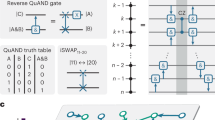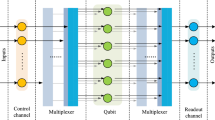Abstract
Precise and fast qubit control is crucial when compiling quantum gates for successful implementation of quantum algorithms. However, the presence of environmental noise and the nonzero bandwidth of control pulses pose challenges for the effective control, particularly for weakly anharmonic systems such as superconducting transmon qubits. To address these problems, in this work we propose a self-navigation algorithm to approximately compile single-qubit gates with high accuracy in the context of transmon qubit. By utilizing this algorithm, the overall rotation distance for the target gate operation is significantly shorter than that of the commonly used U3 gate technique. As a result, a shorter gate time can be obtained. The necessary number of pulses and the runtime of scheme designing scale up as \(\mathcal {O}[\textrm{Log}(1/\epsilon )]\) with a small prefactor, indicating a low overhead cost. Moreover, we investigate the trade-off between effectiveness and cost, and a balance point is identified. Our results demonstrate a reduction in both gate time and noise effects, but without an increase in leakage. Our work opens up a new avenue for efficient quantum algorithm implementations with contemporary superconducting quantum technology.



Similar content being viewed by others
Data and code availability
The code, running environment of algorithm and all data presented in this paper are available from the corresponding author upon reasonable request or from Gitee in (https://gitee.com/mindspore/mindquantum/tree/research/paper_with_code).
References
Nielsen, M.A., Chuang, I.L.: Quantum Computation and Quantum Information 10th Anniversary Edition. Cambridge University Press, New York (2010)
Bishnoi, B.: Quantum Computation (2021) ar**v:2006.02799 [quant-ph]
Preskill, J.: Quantum computing and the entanglement frontier. ar**v preprint ar**v:1203.5813 (2012)
Arute, F., Arya, K., Babbush, R., Bacon, D., Bardin, J.C., Barends, R., Biswas, R., Boixo, S., Brandao, F.G., Buell, D.A., et al.: Quantum supremacy using a programmable superconducting processor. Nature 574(7779), 505–510 (2019)
Gong, M., Wang, S., Zha, C., Chen, M.-C., Huang, H.-L., Wu, Y., Zhu, Q., Zhao, Y., Li, S., Guo, S., et al.: Quantum walks on a programmable two-dimensional 62-qubit superconducting processor. Science 372(6545), 948–952 (2021)
Zhong, H.-S., Wang, H., Deng, Y.-H., Chen, M.-C., Peng, L.-C., Luo, Y.-H., Qin, J., Wu, D., Ding, X., Hu, Y., et al.: Quantum computational advantage using photons. Science 370(6523), 1460–1463 (2020). https://doi.org/10.1126/science.abe8770
Wu, Y., Bao, W.-S., Cao, S., Chen, F., Chen, M.-C., Chen, X., Chung, T.-H., Deng, H., Du, Y., Fan, D., Gong, M., Guo, C., Guo, C., Guo, S., Han, L., Hong, L., Huang, H.-L., Huo, Y.-H., Li, L., Li, N., Li, S., Li, Y., Liang, F., Lin, C., Lin, J., Qian, H., Qiao, D., Rong, H., Su, H., Sun, L., Wang, L., Wang, S., Wu, D., Xu, Y., Yan, K., Yang, W., Yang, Y., Ye, Y., Yin, J., Ying, C., Yu, J., Zha, C., Zhang, C., Zhang, H., Zhang, K., Zhang, Y., Zhao, H., Zhao, Y., Zhou, L., Zhu, Q., Lu, C.-Y., Peng, C.-Z., Zhu, X., Pan, J.-W.: Strong quantum computational advantage using a superconducting quantum processor. Phys. Rev. Lett. 127, 180501 (2021). https://doi.org/10.1103/PhysRevLett.127.180501
Zhong, H.-S., Deng, Y.-H., Qin, J., Wang, H., Chen, M.-C., Peng, L.-C., Luo, Y.-H., Wu, D., Gong, S.-Q., Su, H., et al.: Phase-programmable gaussian boson sampling using stimulated squeezed light. Phys. Rev. Lett. 127(18) (2021). https://doi.org/10.1103/physrevlett.127.180502
Zhu, Q., Cao, S., Chen, F., Chen, M.-C., Chen, X., Chung, T.-H., Deng, H., Du, Y., Fan, D., Gong, M., Guo, C., Guo, C., Guo, S., Han, L., Hong, L., Huang, H.-L., Huo, Y.-H., Li, L., Li, N., Li, S., Li, Y., Liang, F., Lin, C., Lin, J., Qian, H., Qiao, D., Rong, H., Su, H., Sun, L., Wang, L., Wang, S., Wu, D., Wu, Y., Xu, Y., Yan, K., Yang, W., Yang, Y., Ye, Y., Yin, J., Ying, C., Yu, J., Zha, C., Zhang, C., Zhang, H., Zhang, K., Zhang, Y., Zhao, H., Zhao, Y., Zhou, L., Lu, C.-Y., Peng, C.-Z., Zhu, X., Pan, J.-W.: Quantum computational advantage via 60-qubit 24-cycle random circuit sampling. Sci. Bull. 67(3), 240–245 (2022). https://doi.org/10.1016/j.scib.2021.10.017
Barenco, A., Bennett, C.H., Cleve, R., DiVincenzo, D.P., Margolus, N., Shor, P., Sleator, T., Smolin, J.A., Weinfurter, H.: Elementary gates for quantum computation. Phys. Rev. A 52(5), 3457 (1995)
Vidal, G., Dawson, C.M.: Universal quantum circuit for two-qubit transformations with three controlled-not gates. Phys. Rev. A 69(1), 010301 (2004)
Vatan, F., Williams, C.: Optimal quantum circuits for general two-qubit gates. Phys. Rev. A 69(3), 032315 (2004)
Khaneja, N., Glaser, S.J.: Cartan decomposition of su (2n) and control of spin systems. Chem. Phys. 267(1–3), 11–23 (2001)
Tucci, R.R.: An introduction to cartan’s kak decomposition for qc programmers. ar**v preprint ar**v:quant-ph/0507171 (2005)
Vartiainen, J.J., Möttönen, M., Salomaa, M.M.: Efficient decomposition of quantum gates. Phys. Rev. Lett. 92(17), 177902 (2004)
He, R.-H., Liu, H.-D., Wang, S.-B., Wu, J., Nie, S.-S., Wang, Z.-M.: Universal quantum state preparation via revised greedy algorithm. Quant. Sci. Technol. 6(4), 045021 (2021). https://doi.org/10.1088/2058-9565/ac1dfe
Möttönen, M., Vartiainen, J.J., Bergholm, V., Salomaa, M.M.: Quantum circuits for general multiqubit gates. Phys. Rev. Lett. 93(13), 130502 (2004)
Vatan, F., Williams, C.: Optimal quantum circuits for general two-qubit gates. Phys. Rev. A 69, 032315 (2004). https://doi.org/10.1103/PhysRevA.69.032315
Zhang, Y.-H., Zheng, P.-L., Zhang, Y., Deng, D.-L.: Topological quantum compiling with reinforcement learning. Phys. Rev. Lett. 125(17), 170501 (2020)
He, R.-H., Wang, R., Nie, S.-S., Wu, J., Zhang, J.-H., Wang, Z.-M.: Deep reinforcement learning for universal quantum state preparation via dynamic pulse control. EPJ Quant. Technol. 8(1), 29 (2021)
Haug, T., Mok, W.-K., You, J.-B., Zhang, W., Png, C.E., Kwek, L.-C.: Classifying global state preparation via deep reinforcement learning. Mach. Learn. Sci. Technol. 2(1), 01–02 (2020). https://doi.org/10.1088/2632-2153/abc81f
Zhang, X.-M., Wei, Z., Asad, R., Yang, X.-C., Wang, X.: When does reinforcement learning stand out in quantum control? A comparative study on state preparation. Quant. Inf. 5(1), 1–7 (2019)
Yang, X.-C., Yung, M.-H., Wang, X.: Neural-network-designed pulse sequences for robust control of singlet-triplet qubits. Phys. Rev. A 97(4), 042324 (2018)
Niu, M.Y., Boixo, S., Smelyanskiy, V.N., Neven, H.: Universal quantum control through deep reinforcement learning. Quant. Inf. 5(1), 1–8 (2019)
Kliuchnikov, V., Maslov, D., Mosca, M.: Asymptotically optimal approximation of single qubit unitaries by clifford and t circuits using a constant number of ancillary qubits. Phys. Rev. Lett. 110(19), 190502 (2013)
Cross, A.W., Bishop, L.S., Smolin, J.A., Gambetta, J.M.: Open quantum assembly language. ar**v preprint ar**v:1707.03429 (2017)
Chong, F.T., Franklin, D., Martonosi, M.: Programming languages and compiler design for realistic quantum hardware. Nature 549(7671), 180–187 (2017)
Dawson, C.M., Nielsen, M.A.: The solovay-kitaev algorithm. ar**v preprint ar**v:quant-ph/0505030 (2005)
Pham, T.T., Van Meter, R., Horsman, C.: Optimization of the solovay-kitaev algorithm. Phys. Rev. A 87(5), 052332 (2013)
Preskill, J.: Quantum computing in the nisq era and beyond. Quantum 2, 79 (2018)
Krantz, P., Kjaergaard, M., Yan, F., Orlando, T.P., Gustavsson, S., Oliver, W.D.: A quantum engineer’s guide to superconducting qubits. Appl. Phys. Rev. 6(2), 021318 (2019)
Wilson, E., Mueller, F., Bassman, L., Iancu, C.: Empirical evaluation of circuit approximations on noisy quantum devices. In: Proceedings of the International Conference for High Performance Computing, Networking, Storage and Analysis. SC ’21. Association for Computing Machinery, New York, NY, USA (2021). https://doi.org/10.1145/3458817.3476189
Younis, E.: Bqskit-qfactor. https://github.com/bqskit/qfactor
Motzoi, F., Gambetta, J.M., Rebentrost, P., Wilhelm, F.K.: Simple pulses for elimination of leakage in weakly nonlinear qubits. Phys. Rev. Lett. 103, 110501 (2009). https://doi.org/10.1103/PhysRevLett.103.110501
Gambetta, J.M., Motzoi, F., Merkel, S.T., Wilhelm, F.K.: Analytic control methods for high-fidelity unitary operations in a weakly nonlinear oscillator. Phys. Rev. A 83, 012308 (2011). https://doi.org/10.1103/PhysRevA.83.012308
De, A.: Fast quantum control for weakly nonlinear qubits: On two-quadrature adiabatic gates. ar**v preprint ar**v:1509.07905 (2015)
Motzoi, F., Wilhelm, F.K.: Improving frequency selection of driven pulses using derivative-based transition suppression. Phys. Rev. A 88, 062318 (2013). https://doi.org/10.1103/PhysRevA.88.062318
McKay, D.C., Wood, C.J., Sheldon, S., Chow, J.M., Gambetta, J.M.: Efficient \(z\) gates for quantum computing. Phys. Rev. A 96, 022330 (2017). https://doi.org/10.1103/PhysRevA.96.022330
Developer, M.: Mindquantum, version 0.6.0 (2021)
Koch, J., Yu, T.M., Gambetta, J., Houck, A.A., Schuster, D.I., Majer, J., Blais, A., Devoret, M.H., Girvin, S.M., Schoelkopf, R.J.: Charge-insensitive qubit design derived from the cooper pair box. Phys. Rev. A 76, 042319 (2007). https://doi.org/10.1103/PhysRevA.76.042319
Huang, H.-L., Wu, D., Fan, D., Zhu, X.: Superconducting quantum computing: a review. Sci. China Inf. Sci. 63(8), 1–32 (2020)
Tinkham, M., Emery, V.: Introduction to superconductivity. Phys. Today 49(10), 74–74 (1996)
J., A., Adedoyin, A., Ambrosiano, J., Anisimov, P., Casper, W., Chennupati, G., Coffrin, C., Djidjev, H., Gunter, D., Karra, S., Lemons, N., Lin, S., Malyzhenkov, A., Mascarenas, D., Mniszewski, S., Nadiga, B., O’malley, D., Oyen, D., Pakin, S., Prasad, L., Roberts, R., Romero, P., Santhi, N., Sinitsyn, N., Swart, P.J., Wendelberger, J.G., Yoon, B., Zamora, R., Zhu, W., Eidenbenz, S., Bärtschi, A., Coles, P.J., Vuffray, M., Lokhov, A.Y.: Quantum algorithm implementations for beginners. ACM Trans. Quant. Comput. 3(4), 1–92 (2022). https://doi.org/10.1145/3517340
Gilchrist, A., Langford, N.K., Nielsen, M.A.: Distance measures to compare real and ideal quantum processes. Phys. Rev. A 71(6), 062310 (2005)
An, Z., Zhou, D.L.: Deep reinforcement learning for quantum gate control. EPL (Europhysics Letters) 126(6), 60002 (2019). https://doi.org/10.1209/0295-5075/126/60002
Acknowledgements
This work was supported by the Natural Science Foundation of Shandong Province (Grant No. ZR2021LLZ004), and Fundamental Research Funds for the Central Universities (Grant No. 202364008) and the Young Scientists Fund of the National Natural Science Foundation of China (Grant No. 62002349). Run-Hong He would also like to thank **ang-Han Liang, Sheng-Bin Wang, Zhi-Min Wang, and Guo-Long Cui for fruitful discussions.
Author information
Authors and Affiliations
Corresponding author
Additional information
Publisher's Note
Springer Nature remains neutral with regard to jurisdictional claims in published maps and institutional affiliations.
Rights and permissions
Springer Nature or its licensor (e.g. a society or other partner) holds exclusive rights to this article under a publishing agreement with the author(s) or other rightsholder(s); author self-archiving of the accepted manuscript version of this article is solely governed by the terms of such publishing agreement and applicable law.
About this article
Cite this article
He, RH., Ren, FH., **e, YY. et al. Approximate quantum gates compilation for superconducting transmon qubits with self-navigation algorithm. Quantum Inf Process 22, 367 (2023). https://doi.org/10.1007/s11128-023-04125-8
Received:
Accepted:
Published:
DOI: https://doi.org/10.1007/s11128-023-04125-8




